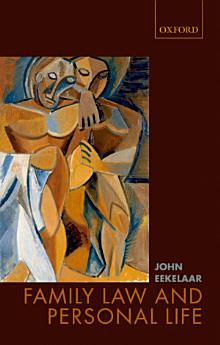Family Law and Personal Life
ਨਵੰ 2006 · Oxford University Press
ਈ-ਕਿਤਾਬ
208
ਪੰਨੇ
family_home
ਯੋਗ
info
reportਰੇਟਿੰਗਾਂ ਅਤੇ ਸਮੀਖਿਆਵਾਂ ਦੀ ਪੁਸ਼ਟੀ ਨਹੀਂ ਕੀਤੀ ਗਈ ਹੈ ਹੋਰ ਜਾਣੋ
ਇਸ ਈ-ਕਿਤਾਬ ਬਾਰੇ
How should our most intimate personal relationships be governed in a liberal society? Should the state encourage a particular model of family life, or support individuals in their pursuit of personal happiness? To what extent do people have the right to shape the lives of their offspring? This book examines the questions at the heart of family law, rethinking the ideas that shape our understanding of the family as a social unit, its purpose, and the obligations and rights that belong to family members. The book explores how the governance of personal relationships has depended on the exercise of power, from the traditional assumptions of patriarchy, where the male head of the family enjoyed full control over his dependents and descendents, to the ideology of welfarism, where state institutions protect the interests of the vulnerable at the expense of their close relations. Emerging from these conflicting ideologies comes today's rights-based culture, where traditional expectations for behaviour within a family sit within a new emphasis on the ability of minorities and traditional dependents to determine the shape of their own lives. Against this background of shifting power relations, the book explores the interrelationship between the legal regulation of people's personal lives and the values of friendship, truth, respect and responsibility. In doing this, a variety of controversial issues are examined in the light of those values: including the legal regulation of gay and unmarried heterosexual relationships; freedom of procreation; state supervision over the exercise of parenthood; the role of fault in divorce law; the way parenthood is allocated; the rights and responsibilities of parents to control their children; the place of religion in the family; the rights of separated partners regarding property and of separated parents regarding their children. Throughout, the book offers a new picture of the intimacy at the centre of personal relationships and argues that only by understanding this intimacy, and its role in human happiness, can we arrive at a true framework for respecting, and governing, the personal lives of other people.
ਲੇਖਕ ਬਾਰੇ
John Eekelaar is Academic Director and Emeritus Fellow, Pembroke College, Oxford
ਇਸ ਈ-ਕਿਤਾਬ ਨੂੰ ਰੇਟ ਕਰੋ
ਆਪਣੇ ਵਿਚਾਰ ਦੱਸੋ
ਪੜ੍ਹਨ ਸੰਬੰਧੀ ਜਾਣਕਾਰੀ
ਸਮਾਰਟਫ਼ੋਨ ਅਤੇ ਟੈਬਲੈੱਟ
Google Play Books ਐਪ ਨੂੰ Android ਅਤੇ iPad/iPhone ਲਈ ਸਥਾਪਤ ਕਰੋ। ਇਹ ਤੁਹਾਡੇ ਖਾਤੇ ਨਾਲ ਸਵੈਚਲਿਤ ਤੌਰ 'ਤੇ ਸਿੰਕ ਕਰਦੀ ਹੈ ਅਤੇ ਤੁਹਾਨੂੰ ਕਿਤੋਂ ਵੀ ਆਨਲਾਈਨ ਜਾਂ ਆਫ਼ਲਾਈਨ ਪੜ੍ਹਨ ਦਿੰਦੀ ਹੈ।
ਲੈਪਟਾਪ ਅਤੇ ਕੰਪਿਊਟਰ
ਤੁਸੀਂ ਆਪਣੇ ਕੰਪਿਊਟਰ ਦਾ ਵੈੱਬ ਬ੍ਰਾਊਜ਼ਰ ਵਰਤਦੇ ਹੋਏ Google Play 'ਤੇ ਖਰੀਦੀਆਂ ਗਈਆਂ ਆਡੀਓ-ਕਿਤਾਬਾਂ ਸੁਣ ਸਕਦੇ ਹੋ।
eReaders ਅਤੇ ਹੋਰ ਡੀਵਾਈਸਾਂ
e-ink ਡੀਵਾਈਸਾਂ 'ਤੇ ਪੜ੍ਹਨ ਲਈ ਜਿਵੇਂ Kobo eReaders, ਤੁਹਾਨੂੰ ਫ਼ਾਈਲ ਡਾਊਨਲੋਡ ਕਰਨ ਅਤੇ ਇਸਨੂੰ ਆਪਣੇ ਡੀਵਾਈਸ 'ਤੇ ਟ੍ਰਾਂਸਫਰ ਕਰਨ ਦੀ ਲੋੜ ਹੋਵੇਗੀ। ਸਮਰਥਿਤ eReaders 'ਤੇ ਫ਼ਾਈਲਾਂ ਟ੍ਰਾਂਸਫਰ ਕਰਨ ਲਈ ਵੇਰਵੇ ਸਹਿਤ ਮਦਦ ਕੇਂਦਰ ਹਿਦਾਇਤਾਂ ਦੀ ਪਾਲਣਾ ਕਰੋ।






